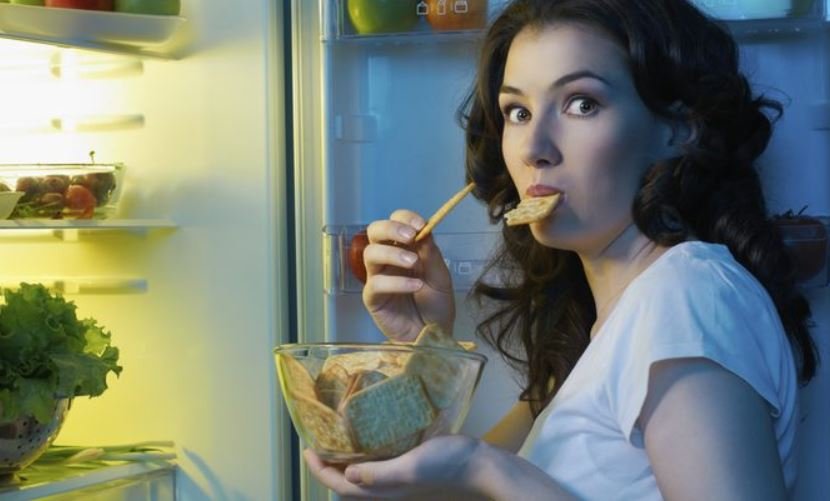

Something about the quiet of night time gets stomachs rolling all around the world, or maybe the hunger pains are just louder, but somehow, binge eating at night is a global phenomenon.
Even people on strict diets during the day, find themselves having a few cookies as they prepare for dinner or searching the pantry for popcorn, “just for the movie” or ice cream, “because how good is ice cream for relaxing?”

How to stop late night eating
That’s simple enough. When eating at night, you are most likely reaching for unhealthy food or snacks. Also, you are eating far more than you need.
Diets and weight loss plans often say you shouldn’t eat a bite after a certain time e.g. 6-7pm, the reasoning being that any food consumed after these hours automatically turns into fat because our metabolism slows down at night.
Some studies argue that this reasoning is not based on actual scientific fact which shows that calorie burning is the same between those who eat later than those who don’t.
But it is an undeniable fact that night-time eating leads to weight gain over time. This is because people who eat at night consume far more food than those who don’t- naturally. Undoubtedly, eating more, will lead to more weight gain.
Just as well. it’s rare that you are going to the kitchen to binge on a quinoa veggie wrap. Most often, you binge on quick easy snacks, like Cheetos. Delicious as they are, they are hardly forgiving on your waistline. Not to mention that snacking on sugary sweets is also likely to spike your blood sugar, hello diabetes.
So, as you gain comfort in being able to eat a little later than you’ve heard, note that you should avoid eating too much and choose a healthy snack instead.
Whatever the case may be, late-night snacks are now a part of your life. Like any other habit, it is difficult to break, but we are a positive lot that firmly believes “where there’s a will, there’s a way.”
It’s impossible to change something you don’t understand. So, the first thing to do is identify two things, when and why?
When do you reach for food in the evenings? Is it when you are watching TV or is it when you are getting that last bit of work done?
Why do you reach for food? Is it because you are hungry? Or is it because you are feeling low? Remember that often we unconsciously eat to numb feelings such as stress and anxiety.
Once you have an idea of the patterns of your eating, it’s easier to identify the triggers as they occur and as a result manage your eating better.
A great way to do this is to keep a food diary where you keep track of exactly what you eat and how you feel before you do so. Studies show that people who keep food journals lost 4-6 times more weight than those who didn’t. It’s also a great way to keep yourself honest, and how easy is it to minimize bad habits?
Late night snacking is most often a response to something- a trigger. Changing this response is as simple as eliminating the biggest cue for your night eating.
Once you have identified when and why you eat, then you have found some of the cues. Changing your routines is a way in which you redirect your responses to the cues or triggers. You can do this in many ways;
Practice any changes you choose to implement consistently and you will find that you will successfully break these behavioral patterns and as a bonus, you will have formed new, healthier habits.
This can seem like a tedious task, but it is undeniable that some of the unhealthiest late-night eats are because you get home after a long day and just cannot be bothered to make a full on healthy meal.
You’ve heard the saying “when you stand for nothing, you fall for everything?” well, when you have nothing healthy in your fridge, you fall for everything unhealthy, be it take out or cookies.
A quick meal prep at the beginning of the week can work wonders, but if that’s too much work, having simple healthy options in the fridge can make for great on-the-go meals that are also healthy. A few greens to make a salad will be much more forgiving to your overall health than strawberry caramel ice cream.
This may seem obvious, but it really does make a difference when you have to work for those extra calories.
Having a full stock of chocolate fudge cookies, skittles, and pop tarts is really just encouraging yourself to snack. As soon as you have a minute, your brain will remind you about your easy to reach sweet treats.
So, make it difficult for yourself and stock up on healthy snacks that are filling. At the very least, if you are really craving a sugar dose, you’ll have to travel some ways to get it, convince yourself to walk and you’ve burned a few calories.
Fun fact- and you probably already know this- you eat more the later you stay up. You also gain more weight, are more irritable and anxious.
The recommended amount of sleep as we all know, so get to bed early enough so that you are not an overweight, cantankerous nervous mess.
Implement the above steps and see an improvement in your life and eliminate unhealthy night snacking. The last key to success in this venture is to believe you can! Have some confidence in yourself and keep your eye on the prize. If you feel you need support, find an accountability partner or ask your friends and family. Most of all, never give up even if you occasionally slip up!